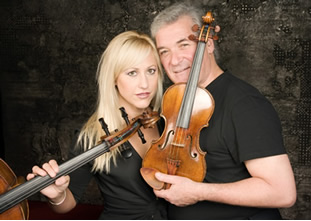The marquee, had there been one, would have proclaimed the names: Abate, Barsamian, Dawson, Karagiozov, Newton, and Schmidt. The great room at Weymouth Center for the Arts and Humanities, in Southern Pines, rang with six outstanding voices on the afternoon of November 3, 2002. Seven, counting the speaking voice of Jamie Allbritten, narrator. The beautiful vocal program by the A.J. Fletcher Fellows from the North Carolina School of the Arts was enlivened by his jovial and enlightening comments in a musical spoken voice. Allbritten, introduced by Weymouth Music Chair, Elaine Sills, is conductor of the Winston-Salem Symphony Chorale and Music Director of the Cantata Singers at the North Carolina School of the Arts in addition to his role as Music Director of the A.J. Fletcher Opera Institute.
The soloists sang to the depth of the room, never overpowering it, which is easy to do. Equally important to the pace of the program was the other support person, Nancy Johnston, pianist, whom Allbritten introduced as a virtual one-person orchestra. Indeed she played orchestral reductions as accompaniment to the opera selections that made up the program. Always strong and secure, yet never obtrusive, her presence made everything else possible.
Gorgeous guttural German exploded from the lips of the ensemble as they opened the program with a Quintet from The Magic Flute by Mozart. Tamino (Antonio Abate) was the first to be heard and not to be forgotten! Emily Newton’s voice rang clear while singing instructions to him and to Papageno, a rather Big Bird in the person of David Schmidt, but then he sings like one! That was meant to be an irresistible compliment.
Krassen Karagiozov, baritone, commenced the solo section with “Questo amor,” from Edgar , by Puccini. His spectacular voice has a professional edge with the texture of which great careers are fashioned. A native of Bulgaria in his second year at the Fletcher Opera Institute, he recently appeared with Piedmont Opera.
To demonstrate the clarity of speech in baroque vocal music, “Iris, hence away,” from Handel’s opera Semele , was programmed next. Clarity of diction was apparent in still another brilliant voice, that of Jennifer Barsamian, mezzo-soprano. Her experience already embraces Glimmerglass Opera’s Young American Artist’s Program.
Since I had so recently reviewed Puccini’s La Bohème Friday night in Greensboro, the frail personna of the Mimi role was fresh in my mind, and although “Addio senza rancor” was extremely well presented by Emily Newton, it seemed so strong as to be out of character.
Cosi Fan Tutte provided an opportunity for Alice Dawson to show off wonderful body language to complement her singing of “Smanie implacable.” Mozart provided hysteria in the orchestra to accompany that which must be enacted by the singer.
Copland’s The Tender Land yielded “The Promise of Living,” presented by the ensemble of six. Outstanding were baritone Schmidt and soprano Newton. She recently appeared with Piedmont Opera. The credits of Schmidt, a graduate of St. Olaf College, include appearances for the Spoleto Festival of Italy and with Opera Company of North Carolina. He will be easily typecast as a leading man in his future career. He has already played such in three Fletcher Opera Institute productions.
Following intermission, “Venti scudi,” from Donizetti’s The Elixir of Love , was entertaining as Abate and Karagiozov outsmarted each other as rivals. Abate’s credits include Aspen, Bowdoin and Marlboro Music Festivals and note that he is an avid recitalist. The Juilliard graduate has appeared with the Juilliard Opera Theater and Opera North in New Hampshire as well as Aspen Opera Theater. It is interesting that Karagiozov holds a Masters Degree in Piano from Southeastern Louisiana State, for he is apparently equally talented in voice.
André Previn has written an opera based on the Tennessee Williams play, A Streetcar Named Desire , premiered by the San Francisco Opera. A gorgeous soprano talent shone forth as Emily Newton fantasized about dying at sea, in that opera’s role of Blanche. Her degree in Vocal Performance is from the University of North Texas. In her second year at the Fletcher Institute, she has sung with the Piedmont Opera.
Rossini was represented with The Barber of Seville . Once again, the impressive voice of Antonio Abate thrilled the audience, this time with “Ecco ridente.” Schmidt’s beautiful voice was heard to advantage in “Pierrot’s Tanzlied,” from Erich Korngold’s Die Tote Stadt .
Not to minimize the impact of the unprogrammed finale, which in fact was tremendous, suffice it to say that it encompassed nine works of Richard Rodgers to celebrate the composer’s recent 100th birthday, in July. There were songs by Rodgers and Hart, Rodgers and Hammerstein, and those for which Rodgers wrote both the words and music. The final number became a Grand Finale: “When You Walk Through a Storm.”
A beautiful blend of six voices swelled as if to overflow the room, and yet it never became overpowering. These young people seemed to sense the size of the great hall and as noted sang throughout the afternoon exactly to its depth and no farther. While those sitting close to the performing artists may have felt overwhelmed, in the back of the room the effect was superlative. Just remember to arrive early at Weymouth for the pick of the seats!
Last but not least, sincere appreciation to the A. J. Fletcher Institute for selecting and forwarding the careers of these talented young people and, in doing so, sharing their beautiful music with the Friends of Weymouth and their guests.











